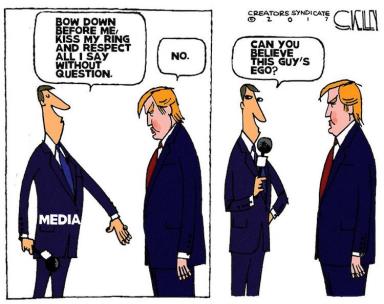
You can get a very good idea of the BBC’s wilfully misleading playing to the gallery attitude and its hypocrisy from two recent speeches, one by Lord Hall Hall, and one by James Purnell.
Lord Hall Hall outlines the BBC’s ever-increasing power bid as it seeks to spread its influence into every media organisation across the country and in many outside as well, and illustrates how the BBC’s ‘diversity’ plan is in essence just a tick-box exercise lacking that thing that Hall Hall claims the BBC is all about…diversity of thought, opinion and intellect.
Today I want to talk a little about why this is so important right now, about what we at the BBC can do to help and how the whole of the industry must come together to support a project that is vital to all our futures.
There’s too big a gap between the education sector and the industry. And as an older generation retires, the struggle is to find a new generation with the skills to replace it.
But the truth is, broadcasting in particular remains a relationship-based, ‘who you know’ industry.
Too often, employers offer placements and internships through networks or contacts. Of course, this marginalises those who don’t have connections, especially those outside the big cities, and it favours the well-connected and well-off from the South East of England.
A sector that, instead of being a force for social mobility, is too often a source of social exclusion.
At the BBC, this is a problem we take very seriously.
First, because it’s part of our mission to represent, and be representative of, the whole of the country.
And second, because we’re really serious about being the most creative organisation in the world.
We know we can’t achieve this unless we draw on the full creative potential of the whole of the country – and allow no barriers to get in the way.
Getting the very best at the BBC means making sure we draw on all of the talent the country has to offer.
Ours is already one of the most diverse workforces in the UK…For me, one of the real priorities is to get more women, and more people from black, Asian and minority ethnic backgrounds, into our most senior leadership positions.
And, let me say, this is not just about investing in top talent for the BBC – it’s for the whole industry. One of our first group of Assistant Commissioners, for instance, is now a comedy commissioner at Sky.
To truly address the problem, there has to be sector-wide leadership, and a collective response.
That’s where the role of the National College is so vital….
We want to open up the BBC to you – in every way we can.
I’m aware that a National College needs a national orbit. And as the only employer in our sector who’s everywhere across the UK – I want to throw open our doors.
Can we help you develop regional centres around the UK and widen access to training?
Can we host students at our base in Birmingham, for example? Or in Salford at MediaCity?
We want to put our expertise at your service.
Yep…putting the BBC’s expertise at other meida organisation’s service…and making sure a BBC ‘ethos’ is spread along with that ‘expertise’.
Purnell gives a fine example of the anti-Brexit hypocrisy as he argues for ever-increasing BBC dominance to ‘protect our culture’….
The future of broadcasting isn’t the only thing that will shape the future of our culture. But it matters.
We may not realise what an important thing we could be losing. That in a very English, informal, un-strategic way we lose control of our culture. No one wills it. Nor has it happened yet. But if we don’t act soon our culture could soon be mostly baked on the other side of the Atlantic.
The one thing we do know is that if we get it right, the future of our culture will be supported. Because we will have British institutions, telling British stories, so that we continue to be able to shape our way of life, our customs, ideas and beliefs.
That matters for our culture and OFCOM should have the power to intervene in on-demand environments, not just linear ones, as now to secure prominence for public service content.
Purrnell’s speech is in effect a massive land grab, a power grab that aims to keep the BBC on top, dominating the media landscape as he demands special treatment for the BBC as it is being outgunned by the [American] commercial sector…Purnell wants government intervention to ensure the BBC remains on top as it moves into the digital realm….note his moan about how the media has become less democratic…emm…as the giant BBC is elbowed out of the way by the consumers choosing to watch the massive ‘giant media oligarchs’ such as Amazon or Netflix or Google and Facebook…so more consumer choice is less democratic? Seems the BBC is just a bit jealous that it has competition for its long held almost monopoly of the media scene…,.
In creating the BBC, Britain gave an example to the world of how the right application of new technology could democratise culture.
Britain managed to develop a model that had the best of all worlds.
A thriving market alongside ambitious public provision.
An openness to American imports made possible by our confidence in our own creative industries.
We never tried to keep Hollywood out, because we were confident that our stuff was good enough to compete – and it was.
That success was built on two foundations – investment and distribution. We funded wonderful work. And we made sure audiences could find it.
But today, we have some good news and some bad news. The bad news is that both of these are under threat. The good news is that there’s a way to rescue them.
The Economist reported last month that this is a golden age for couch potatoes.
Netflix’s revenues have tripled in five years. Its annual content budget is more than the BBC’s entire income.
There are 350,000 podcast strands available on iTunes. 13 million individual episodes. It would take around 50 lifetimes to listen to them all.
So, this is a Golden Age for consumers.
British talent benefits, as well. The BBC’s House of Cards got remade as Netflix’s first blockbuster drama, while the Night Manager and the Crown shared five awards at the Golden Globes.
But here is the rub. The Crown cost over £100 million. That could have funded BBC2 for three months. Sky and BT spend as much on the Premier League rights every year as BBC One and Channel 4 do on programmes.
As The Economist also said “entertainment has in some ways become less democratic, not more. Technology is making the rich richer, skewing people’s consumption of entertainment towards the biggest hits and the most powerful platforms. This world is dominated by an oligarchy of giants, including Facebook, Google, Amazon, Netflix and Disney.”
Every single one of them American.
If our media became dominated by a few American companies, however innovative and well-intentioned, how would that affect our culture, and its ability to evolve?
So, yes this is a golden age for British industry and talent. It is a golden age for consumers. But will it be a golden age for our culture?
the position is precarious.
If investment in British content continues to fall, our cultural success will be in jeopardy.
How do we avoid that? How do we get the best of all worlds again?
First, we need to grow. That will be mainly down to us, the industry. And it’s starting to happen….Thanks to tax credits, an extra £2 billion has gone into films and television programmes.
The BBC’s role is the same today as it was in 1922. It is to bring the best of everything, to everyone.
To do that, as Tony Hall said in January, we need to reinvent public service broadcasting, for a new generation.
To continue to deliver our public purpose, we need to stop this decline by investing.
And in education, we’ll explore new ways of reaching audiences too.
We’ve got many of the world’s best cultural institutions…..The BBC is their loudhailer.
We’re also going to be working with our partners inside and beyond the BBC to create thoughtful content aimed at this audience. And we’re going to see how the BBC can help people consuming that content make even more of it, by learning more about themselves and showing them onward education journeys….We call this scheme of work Ideas Service.
The one thing we do know is that if we get it right, the future of our culture will be supported. Because we will have British institutions, telling British stories, so that we continue to be able to shape our way of life, our customs, ideas and beliefs.
We all need to reinvent radio, to make sure the next generation grows up with a radio habit.
But there is one more urgent thing Parliament can do.
In the 2003 Communications Act, Parliament took a far-sighted decision. It insisted that the Public Service Broadcasters should be at the top of the programme guide on satellite, cable and DTT. That reform has worked well.
But as audiences move to on-demand services like iPlayer that provision risks becoming less effective. New TV set-top boxes and Smart TVs only have a limited number of slots on their front page. If those places are filled by the content from the platform owners or from Netflix, Amazon, Facebook, or Spotify , that leaves little room for the Public Service Broadcasters.
That matters for our culture and OFCOM should have the power to intervene in on-demand environments, not just linear ones, as now to secure prominence for public service content.





